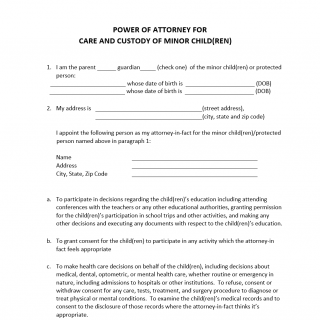Guardian Power of Attorney
A Guardian Power of Attorney, also known as a Parental Power of Attorney, is a legal document that allows a designated individual (called the guardian or attorney-in-fact) to take care of a minor child's needs in the absence of their legal guardian or parent. It is a temporary transfer of parental rights from the legal guardian/parent to the designated individual. This document consists of several sections that specify the powers granted to the guardian/attorney-in-fact, the duration of the power, and other relevant information.
The first section of the document identifies the legal guardian/parent who is transferring their parental rights and the designated individual who will act on behalf of the child. The powers granted to the guardian/attorney-in-fact may include the ability to make decisions about the child's education, healthcare, travel, and other necessary provisions.
A Guardian Power of Attorney is drawn up in cases where the legal guardian/parent is unable to take care of their child for a prolonged period. This might occur because the legal guardian/parent is traveling, serving in the military, or is otherwise unavailable. The designated individual who acts on behalf of the child could be a family member, a friend, or a professional representative (such as an attorney).
When compiling a Guardian Power of Attorney, it is essential to consider many things. Firstly, the legal guardian/parent should trust the designated individual and be comfortable with entrusting their child's care and decision-making authority to this designated individual. Second, the document should specify the powers granted to the designated individual as explicitly and specifically as possible. It is also crucial to comply with state and federal law to avoid potential disputes, challenges, or legal conflict.
The advantages of having a Guardian Power of Attorney are significant. Firstly, it allows the designated individual to take care of the child's needs when the legal guardian/parent is unavailable. This document can help avoid disruption to the child's life and ensure that their interests are protected while the legal guardian/parent is unable to take care of them. The power of attorney can streamline decision-making, making it easier for the guardian/attorney-in-fact to take care of the child's needs more efficiently.
There can be many problems if the Guardian Power of Attorney is filled out incorrectly or without proper consideration. For example, a lack of specificity regarding the powers granted, confusion regarding the documents' execution, or other legal technicalities can lead to disputes or conflicts. It is essential to ensure that the document is correctly filled out, signed, and executed in accordance with applicable state and federal laws and regulations to avoid disputes and conflicts.
In conclusion, a Guardian Power of Attorney is a legal document that allows a designated individual to take care of a minor child's needs in the absence of their legal guardian/parent. This document can help avoid disruptions to the child's life while the legal guardian/parent is unavailable, ensuring that their interests are protected.

